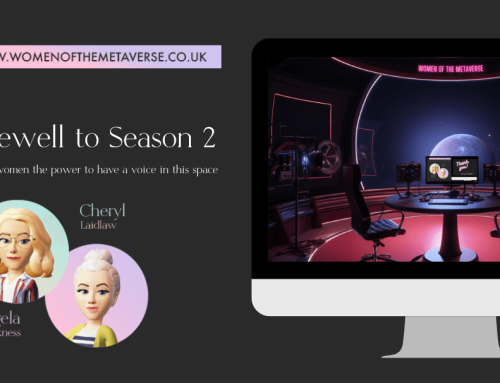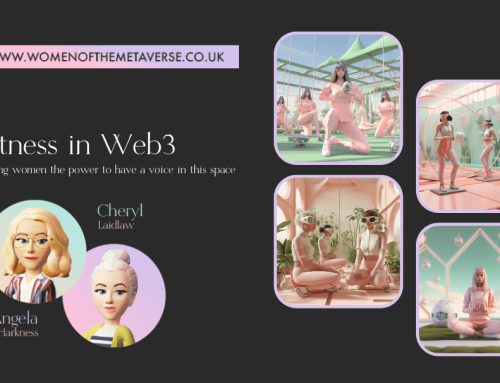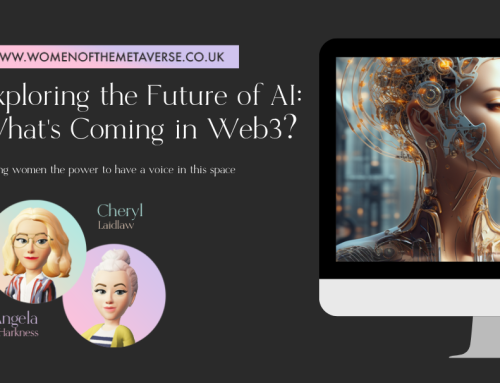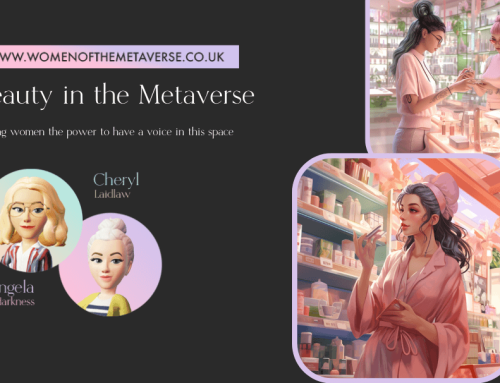How will AI change the world?
In this episode, we are talking about the incredible growth in Artificial Intelligence platforms. We discuss how AI will change the world; change our day to days lives, businesses and careers.
MENTIONED IN THIS WEBSITE
ChatGPT – https://chat.openai.com/chat
Sophia Robot – https://www.instagram.com/realsophiarobot/?hl=en
Microsoft Bing – https://www.bing.com/new?form=MY028Z&OCID=MY028Z
Synthesia – https://www.synthesia.io/
Discord – https://discord.com/
Midjourney – https://www.midjourney.com/
Sembly – https://www.sembly.ai/
Time Hero – https://www.timehero.com/
Poised – https://www.poised.com/
EPISODES MENTIONED
Episode 40 – What is ChatGPT and why you should be using it – https://www.womenofthemetaverse.co.uk/what-is-chatgpt-and-why-you-should-be-using-it/
We hope you enjoyed the show and that it inspired some ideas. Join us next week to delve further into the Metaverse
If you have any questions, comments and/or want to become part of our community join us on our Facebook group and/or on Discord.
Or visit us here:
Website: www.womenofthemetaverse.co.uk
Instagram: https://www.instagram.com/wotmworld
Twitter: https://twitter.com/WOTMWorld
TikTok: https://www.tiktok.com/@wotmworld
IMPORTANT NOTICE
This podcast is for entertainment and education purposes only. We do not give any investment or financial advice and we strongly recommend you always DO YOUR OWN RESEARCH.
Show Transcript
[00:00:00] Cheryl: Welcome to Women of the Metaverse. I am Cheryl Laidlaw
[00:00:07] Angela: I am Angela Harkness. We have been and are still on a journey to discover the Metaverse with 3.0 NFTs and anything that we are required to know to join this world.
[00:00:21] Cheryl: From this podcast, we will help you to unlock how the Metaverse is going to impact your brand, your business, and even your personal life.
[00:00:31] Angela: Join us as we take the mystery out of this new digital universe. Welcome to Women of the Metaverse. In this episode, we are talking about a. because everyone and their dog is talking about this subject right now, and we want to tell you how it’s gonna change the world. So first of all, Cheryl, what is ai?
[00:00:57] Cheryl: Artificial intelligence is a [00:01:00] combination of many different technologies working together to enable machines and apps to sense, comprehend, act, and learn. With human-like levels of intelligence, AI machines can be trained using large amounts of data and algorithms, allowing them to learn and make predictions or decisions based on patterns in the data.
[00:01:26] Cheryl: So with this in mind, I asked chat, G p T, how long does it take to create an AI program? And this is the answer. For relatively simple AI applications such as a chat bot that can respond to basic questions, it may only take a few weeks or months to build a working prototype. However, more complex AI systems such as those that involve image or speech recognition can take much longer, sometimes [00:02:00] several years to develop and, and fine.
[00:02:05] Cheryl: So interestingly, chat’s G P T started in 2015, and the first version was actually released in 2018.
[00:02:16] Angela: What, which was the open AI one, which would’ve been
[00:02:19] Cheryl: open ai, I think, and would’ve probably only gone out to about 200 people to test.
[00:02:25] Angela: Yeah.
[00:02:25] Cheryl: And, and, and learn, you know, learn more about it. Um, And I, I, I actually remember going to a conference in 2019 and meeting Sophia the robot, which of course was all about her being able to have a human response.
[00:02:49] Cheryl: And that at the time was, you know, a year after. And again, it kind of all makes sense that it was 2018 because she’d already been, [00:03:00] I dunno what you call it, touring. Touring the world, touring ,
[00:03:05] Angela: the robots on tour. Yeah. I
[00:03:07] Cheryl: was actually really excited to, um, to meet Sophia on stage, um, in, in 2019 because again, it’s something that takes years and years and years
[00:03:20] Angela: to develop.
[00:03:21] Angela: I think when people think about ai, that’s what they think about as well. But robots, robots will do this. So I think chat, G P T and some of these other ones that have just hit us, people are like, oh, okay, this is actually this. This is not difficult to use. You just need to learn how to prompt. It’s all data.
[00:03:40] Angela: It’s all, yeah,
[00:03:41] Cheryl: it’s all data. So much data throughout the years and I wouldn’t be surprised if it’s the same technology as, so as Sophia, the,
[00:03:48] Angela: uh, the broker probably. probably. It’s probably, it’s gonna be common technology, isn’t it? And I know that I have seen some people use chat G p T to write AI platforms, to [00:04:00] actually write other AI tools.
[00:04:01] Angela: Okay. So, you know, it’s, it’s gonna be quite interesting cuz they’re all gonna get smarter as well, aren’t they? Which is exactly what I’m just about to tell you, . So what does it have to do with the future of ai? Well, since the release of chat, G P. So learn about that in episode 40. We’ll leave a link in the show notes.
[00:04:23] Angela: It seems a lot of other fantastic AI projects have also been released. We already have driverless cars and voice automation in homes. Artificial intelligence has progressed rapidly and is no longer just a concept from sci-fi movies and books. According to research by scientists at the University of Oxford, artificial intelligence will be better than.
[00:04:48] Angela: Translating languages by 2024. That’s amazing. Writing school essays by 2026, selling items by 2031. [00:05:00] Writing a bestselling book by 2049 and conducting medical surgery by 2053. In the next few years, AI will become a huge part of our lives. Imagine opening a door of your home without a. , but rather through facial recognition tools, your face will become your identity.
[00:05:20] Angela: Making everyday transactions easier and more efficient. I also think those dates will be quicker cuz I think the speed at which we are now seeing it launch, I think yes. You know, I’m sure people are already using it to essays. Oh yes.
[00:05:38] Cheryl: Well then now there’s the tool that that’s just been brought out so teachers know who’ve been using it to cheat on their homework.
[00:05:45] Cheryl: Yes. So again, that that new tool has only been developed in the last Yeah. Three
[00:05:52] Angela: weeks. Oh, who knows. And I know that there’s also tools now, because in episode 40 we were talking about the fact that chat, [00:06:00] G P D only has data up until the end of 2021. , but now there are already Google extensions, which enable you to have up to date data.
[00:06:11] Angela: And then the next version of chat, G P T, which has come out in Microsoft, probably has more up-to-date data. It just every day just something new is coming out, isn’t it? Yeah. I mean, we al
[00:06:22] Cheryl: already have the face recognition with our mobile phones, our banking. Um, I spoke to Angela a while ago about having our own social.
[00:06:33] Cheryl: Number, a bit like Uber, where we’ll be, um, where potentially we’ll be scored out of 10. Yes. By what kind of human being we are. Yeah. .
[00:06:45] Angela: Hey, you, we did have that conversation, right? It’s like scary to think about it. Not scary, but just what directions it might take or what might come out. You know, because I think sometimes inventors quite [00:07:00] rightly have no limit.
[00:07:03] Angela: they just think, I wanna invent this, and then society has to go, yes or no, or how can we use this properly in society? Just fascinating though, but imagine also having your product delivered by small drones. So I’ve seen, I have seen this a little bit straight to your door set within hours of placing an order and you know what’s.
[00:07:27] Angela: With me. I was thinking this would be great, but it will drive me up the wall listening to noisy drones deliver stuff to people if they can make silent dragon noisy. Oh God, yeah. That like they have like hover above for me. It will be noisy if they can create silent drones. I’m for it. Okay, so I
[00:07:47] Cheryl: did some research on this to see how far, how far away we were.
[00:07:52] Cheryl: And Amazon says that it is ready to fly de deliveries by drone as soon as federal [00:08:00] rules allow. But experts suggest that technologies still need to be ironed
[00:08:05] Angela: out. Yeah, but they have, we don’t have them here. Well, maybe we do, but we’re both in the suburbs a little bit. But I know some people get like little robots deliver.
[00:08:16] Angela: Like Postmates than that in America sometimes. Then, yeah. I remember Chrissy, Tegan had it on her, um, Instagram once, but they had something come and deliver. So sometimes they, you see them at the, apparently you see them at the crossings and you know, So it’s already starting to be integrated a little bit.
[00:08:39] Angela: Society. Amazing. Yeah. What about imagine AI-based virtual assistance will replace human like calls to book an appointment. That’s probably gonna be something. Yeah,
[00:08:51] Cheryl: we have this at the moment. It’s a bit shoddy, isn’t it?
[00:08:54] Angela: Yes. I think all, always with these things. , if companies do them [00:09:00] well, it works. Mm-hmm.
[00:09:01] Angela: Mm-hmm. . But always you’ve got to, and we talk a lot about, you know, maintaining a brand and brand values. You’ve got to have those. Where something is out in the ordinary when you just need to speak to, you know when you sit on hold, cuz they’re telling you if you go to the website, you can book it, you can do it on the website and you’re like, I just wanna speak for human.
[00:09:23] Angela: I don’t wanna listen to something made. Yeah. So if you do it right, then it works well, doesn’t it? So, but what about robotic surgery in the next few years of physical surgeon? Will only be a spectator as a robot, actually performs the surgery and help patients better understand their care options. How do you feel about that, Angela?
[00:09:48] Angela: Having I think, I, I think it depends what it is, because potentially you could have a doctor overseeing Oh yeah. That that’s what they’re, therefore, yeah. But you could have a doctor potentially [00:10:00] overseeing more than one operation at the same time, which. , you know, cut wait times for operations. It also could potentially be used in countries where it’s maybe difficult for a team of doctors to get to.
[00:10:16] Angela: So you could have somebody with a robot go or sort of in, in, um, where there’s military situations, maybe that sort of thing could be used there, like your thought
[00:10:28] Cheryl: process. That’s
[00:10:29] Angela: very good. Or e or even, um, paramedics. So rather than bringing somebody back to the hospital, there’s potentially things that could be done at the site of an accident or somebody’s home if they’re sick.
[00:10:41] Angela: That would help beca rather than waiting for them to get to get to a hospital. Speeding up the whole process really. Yeah, potentially. Potentially. And potentially the chance of errors may be lessened by not having human. impact because they’re programmed so precisely, [00:11:00] but
[00:11:00] Cheryl: they are programmed by human beings.
[00:11:02] Cheryl: So yeah,
[00:11:06] Angela: not, I guess we’ll just have to see. I mean, they may have like, there’s, you know, they use much more robotic tools anyway. Doctors now, don’t they, for a lot of things and cameras and yeah, the kids, you know, we know they’re using vr. So we can see, these are just a few examples of how AI will change the. So what’s available now that maybe people didn’t know about?
[00:11:29] Cheryl: Okay. So we’re going to give you a list of only the best ones that are going to help you in your business. So first up, we have Synthia. Synthia is an AI video creation platform that creates a video in minutes using realistic models. , you can create one for free, but they recommend upgrading to a personal package at $30 per month.
[00:11:54] Cheryl: So I had a little deep dive into this and had a look to see how easy it [00:12:00] was. Um, and it’s, and, and who would actually use it. And I would say it’s for bigger brands or people that don’t actually want to be in front of the camera. and lots of, again, lots of TikTok people have created their own AI models.
[00:12:16] Cheryl: Mm. And then just generated content that this model then talks to camera in a very professional manner that’s representing the brand.
[00:12:27] Angela: I think brands are gonna start to create sort of avatar type influences and maybe use this, these type of
[00:12:33] Cheryl: tools. Yeah, this is definitely the beginning.
[00:12:36] Angela: Yeah. But I guess it’s sort of like the, you.
[00:12:40] Angela: Maybe it creates that avatar of the perfect customer. So if you go to the website, it comes up as, oh, you feel like somebody’s talking to you because you are the perfect customer. Maybe again, if that’s gonna come down to imagination, isn’t it? Sure
[00:12:57] Cheryl: is. The next one. Um, probably one of our [00:13:00] favorites, and we use this on every episode of our podcast.
[00:13:03] Cheryl: That is Mid journey. Mid Journey is a tool that creates images using, uh, text descriptions. So we’ve been using this on every single, um, featured image, uh, for the podcast.
[00:13:19] Angela: Yeah, Sarah’s got very good at it. I’m not as good because it takes . It, it takes, you have to, first of all, you have to know what you want.
[00:13:28] Angela: I think that’s the, you know, when we’re trying to create images for. and then getting Mid Journey to do what we want it to do. So shows much better than it than I am, but it, we’ve done a whole episode or doing a whole episode about Mid Journey, so you can learn more about it on that episode, but it’s a fantastic.
[00:13:50] Angela: AI
[00:13:51] Cheryl: tool dedicated a whole episode to it. So listen. The next one is called Assembly. Now, I haven’t actually used this tool [00:14:00] yet, but as soon as I saw the description, it is a no-brainer. So Assembly is a tool that transcribes and analyzes meetings. So your Zoom meetings, for example, transforming form them into action insights where even a tool to automate your follow-ups.
[00:14:21] Angela: See, this I think is brilliant cuz I, one of the things I think I really like about all the AI is how you are gonna be able to automate very simple tasks and create really good processes, which I. All large brands and small brands, small businesses really suffer from not having efficient processes that cost them money and mean that you don’t put that time into doing what you actually create the business to do.
[00:14:50] Angela: Mm-hmm. So this sort of things, I, my
[00:14:52] Cheryl: friend Aist, they’re not aist, uh, an assistant for a doctor and she has to go in and write minutes all the time. Yeah. Now, [00:15:00] if she just plugged this tool in, she wouldn’t have to do much of the work at. .
[00:15:05] Angela: I actually worked at a bank once and it was a very specialist. I didn’t work in this area.
[00:15:11] Angela: I did some, a project for them, but it was a very, very specialist area of the bank, like, almost like board level or um, regulated level that were, there was a team of women and what they did or what team of women, team of people that what they did was just bright minutes, but they were very complex and detailed.
[00:15:33] Angela: Sort of regulated minutes, and sometimes it would take them like three weeks to write these minutes. They only worked on sort of one meeting, then took all the time to work on the minutes till they did the next one because of how regulated they were. These sort of tools would be amazing for that because it would probably cut a lot of time and make the process more efficient and make sure that they were sticking to the regulations because you could [00:16:00] train the AI to do that.
[00:16:02] Angela: Yeah, there’s a lot in this. I really, I think, yeah, especially if you report back
[00:16:06] Cheryl: to your boss, lots of reports going, you could just minimize that whole, that whole
[00:16:11] Angela: process. Yeah, because one of the things, when I worked in corporations, I hated reporting for reported sake. There’s always management. There’s a lot of that, isn’t there?
[00:16:17] Angela: Yeah. I need a report for this. Why? What is it? What do you need it for? Are you gonna read it? Probably not. So yeah, this, this automation of start I think is really good.
[00:16:28] Cheryl: Time Hero is up next. If you have a lot of projects and have a deadline, time Hero will sort out your diary by inputting tasks. Into your calendar, you will need to fill the projects and the time allocated for each task and the deadline and time Hero does the rest, which, um, I think is brilliant because if you have a task that takes six hours, chop it up into different, um, [00:17:00]
[00:17:01] Angela: I dunno, smaller, yeah, like modules and it
[00:17:04] Cheryl: will literally put it in your diary.
[00:17:07] Cheryl: Um, for someone that overthinks everything,
[00:17:11] Angela: I, yeah, me too. It’s crazy. I’m really terrible because I’m, you know, much more big picture breaking things down into detail I find really difficult. So this sort of thing for me potentially kind of helps me break up the day. But I’m also seeing this as people who work in project management.
[00:17:30] Angela: Like project management is really complex. Trying to get a big, um, program management. I. You know, the advancement of AI in this and how you can actually do a program. You know, even for everything, like if you’re building houses or you’re building a new piece of software, whatever, these kind of AI and project management, I think will become powerful tools.
[00:17:50] Angela: Mm-hmm.
[00:17:51] Cheryl: Definitely. So the last one is poise. This is an AI powered communications coach. that [00:18:00] will help you become a better speaker, interviewer, or presenter. So get this right. It connects with your video calls and gives you real time feedback on everything from the words that you use and you speak the most to the filler words.
[00:18:20] Cheryl: The confidence, the energy. If you have enough empathy on the call, and it can even tell when you’ve interrupted too many times on a, on a zoom call, how good is
[00:18:31] that?
[00:18:32] Angela: We need to try that , we should try that because one of the problems that we have is the filler words. I definitely have a problem with the filler words.
[00:18:41] Angela: We, we all do. Yeah. It will be really good to see what that. And if also if it, cuz it’s got to allow your personality, hasn’t it? Hmm. It’s got to learn your personality, but also not to learn your personality, but definitely. , um, if it helps you to become a better [00:19:00] speaker. Yeah, that would be good. I’m interested to try.
[00:19:03] Angela: Yeah, I am. We should try that . So if you
[00:19:06] Cheryl: get a chance to look at any of these tools, all the links are in our show notes on our website. We would love to hear what
[00:19:13] Angela: you think. Yes, cuz this is just a very small sample of the AI available today. But every day. I mean, we are not joking when we say this every day.
[00:19:25] Angela: The list. So let us know your favorite one. We hope to enjoy this episode. Join us next week as we continue our journey into the Metaverse. Bye for now. Bye. Thank you for listening to this episode of Women of the Metaverse.
[00:19:45] Cheryl: You can find all information, links and people we talked about in the show notes on our website.
[00:19:50] Cheryl: If you have
[00:19:51] Angela: enjoyed this podcast, please comment and subscribe.
[00:19:55] Cheryl: Join us again in the next episode as we continue this exciting [00:20:00] metaverse journey.






Leave A Comment